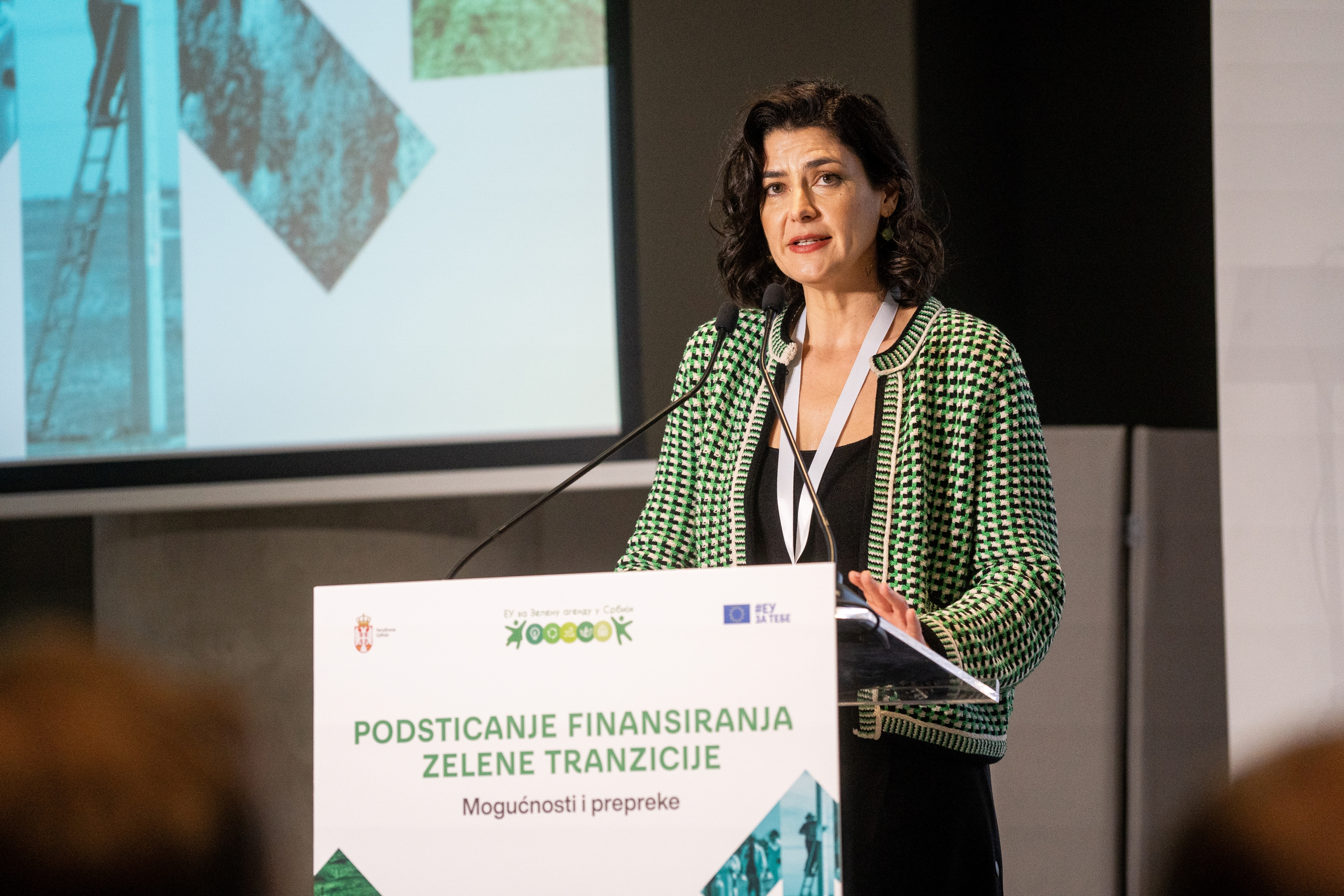For greater competitiveness of domestic companies and the creation of new jobs while preserving the environment and public health

Belgrade, 27 January 2025 – In order to contribute to the creation of a sustainable financial framework enabling a more efficient green transition in Serbia, United Nations Development Programme (UNDP), the Delegation of the European Union to Serbia, the Ministry of Environmental Protection and the European Investment Bank (EIB) organised a conference in Belgrade last week on the opportunities and obstacles for promoting the financing of the green transition. The event was organised in cooperation with the Association of Serbian Banks (ASB) and brought together representatives of relevant state institutions, commercial banks, international financial institutions, international organisations and the business sector.
The conference focussed on improving coordination between the financial and business sectors, which is essential for the green transition process. Successful green financing mechanisms that have already been implemented in Serbia were discussed, as well as the main directions for improving the regulatory framework for financing this transition.
State Secretary of the Ministry of Environmental Protection, Sandra Dokić, emphasised that the Ministry is fully committed to further improving the policy and legal framework to enable a faster and more efficient transition to a green economy by facilitating access to financial resources for green projects.

Sandra Dokić, State Secretary of the Ministry of Environmental Protection
“The 'Green Agenda in Serbia' platform is an excellent model for mobilising green investments and pooling the necessary financial resources. Together we have made significant progress so far, as we have raised interest in green economy projects from businesses, but also from local governments and public companies. Now it is important to provide additional support to accelerate these investments”, Dokić explained.
She added that the Ministry is ready to work intensively in the coming period on developing institutional capacities, networking with relevant institutions and stakeholders, establishing procedures and defining a comprehensive national mechanism for green financing that involves state institutions, international financial institutions and commercial banks, as well as businesses and the public sector.
Deputy Head of the EU Delegation to Serbia, Plamena Halacheva, stated: “The EU is designing new tools to combat global warming and is implementing the EU Emission Trade System to put a price to carbon, that aim at significantly decreasing Green House Gases through collective and shared efforts. We stand side by side with Serbia to support the reduction of emissions and help mitigate the effects of climate change with a wide range of projects and concrete actions.”

Plamena Halacheva, Deputy Head of the EU Delegation to Serbia
Head of the EIB Regional Hub for the Western Balkans, Damien Sorrell, cited the “EU for Green Agenda in Serbia” initiative as an excellent example of how we can catalyze green investments, stating that the projects supported under this initiative will help make the country’s economy and SMEs become more resilient to the devastating effects of climate change.
“This is particularly important for local companies, 10% of which are already reporting losses from natural disasters. However, due to a lack of access to finance, expertise in developing green projects, and conducive green management practices, they are not sufficiently equipped to incorporate climate concerns into their management frameworks. That is why the technical support provided by the EIB to banks under the EU for Green Agenda is crucial. It will help turn innovative climate-friendly ideas into bankable projects”, Sorel stated.

Damien Sorrell, Head of the EIB Regional Hub for the Western Balkans
“The establishment of an effective mechanism for sustainable financing of the green transition is crucial for the competitiveness of the Serbian economy and the creation of new jobs, as well as for people's health and the environment. This requires the cooperation of the government, international financial institutions, commercial banks and the private sector, which we have gathered today to achieve a common vision for accelerating the green transition in Serbia”, said Yakup Beris, UNDP Serbia Resident Representative.

Yakup Beris, Resident Representative of UNDP in Serbia
The conference identified the specific needs of the economy and financial sectors, as well as the government institutions, to improve their ability to better utilise and allocate available funds to activities and projects that contribute to the green transition. Best practises for the identification and approval of financing for green projects were discussed. The conference also highlighted the steps needed to utilise the funds allocated for green initiatives more efficiently.
Representatives from “Nelt” DOO, “Zorka-Keramika” DOO and “Steel Impex” DOO shared their experiences with ‘green’ financing at the event. They have successfully implemented their innovative green projects, which are supported by the “EU for Green Agenda in Serbia” initiative.
Since 2022, this initiative has provided $4.17 million in mentoring support and co-financing for the implementation of innovative green projects across Serbia. For every dollar of donor support, nearly $6 has been raised from other sources, including the beneficiaries' own funds. As a result, over 30 million dollars have been invested so far, which accounts for approximately 15% of all estimated green investments in Serbia.
The project “EU for Green Agenda in Serbia” is implemented with technical and financial support from the European Union and in partnership with the Ministry of Environmental Protection by the United Nations Development Programme (UNDP) in cooperation with Sweden and the European Investment Bank, with additional funding from the governments of Sweden, Switzerland and Serbia.

Fabrizzio Andreuzzi, Deputy Resident Representative of UNDP in Serbia

 Locations
Locations


